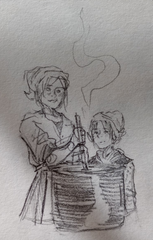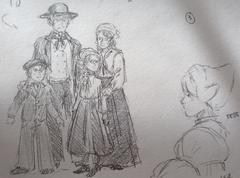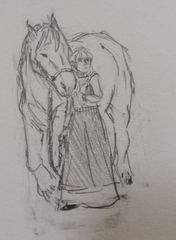Your cart is empty now.

A Birthday Lesson
The Netherlands – Summer, 1846
Today is Friday, July 31. My birthday! But I still have to do my chores. I feed the chickens, gather eggs from the hen house, and weed the beans in record time.
Why so quickly? Because Mother promised to begin teaching me to make cheese today.
But she’s in no hurry. She sweeps the front steps and the path to the lane. Then the back steps. Then the front steps again. I play with Luc while she waters the petunias in their window boxes and the roses on the lattice.
At nine o’clock, Mrs. Huizen arrives. “Hello, Tess,” she says. “Happy birthday!”
“Thank you.”
When Mother isn’t looking, she slips me a piece of candy.
I’ve always liked her. She’s a grown woman and married but still remembers what it’s like to be a girl.
Luc is happy to see her too. He says, “Why are you here?”
She grins at him. “To keep a certain someone out of mischief.”
“What’s mischief?”
She picks him up and holds him high over her head. “You are.”
Content that Luc is in good hands, Mother leads me to the cheese shed.
In the center of the shed is a cookstove and beside that a stack of wood. Under Mother’s careful direction, I start a fire in the stove.
Once it’s going, she says, “Now we wait.”
“For what?”
“For the stove to give off a steady, consistent heat.”
When the fire settles down and the stove is ready, she helps me pour several gallons of fresh milk from Madam Maas and the other cows into a large cooking pot. We place the pot on the stove so the milk can warm.
“Now we wait.”
She pulls up a stool and I do the same. I ask her, “Will we keep making cheese even if no one will buy it?”
“Milk doesn’t last,” she answers. “Cheese does. Hopefully, there will be better days ahead.”
“Soon?”
“We can hope.”
“I don’t want to hope,” I say. “I want to know.”
She smiles, but there is uncertainty in her eyes. “We can’t always know. Sometimes hope is all we have.”
We sit in silence, then I say, “Can I ask you a question?”
“What’s on your mind?”
“What made the state church change?”
She looks at me, surprised, then says, “That’s complicated.”
“I’m fourteen now. I can understand complicated things.”
“Well, it didn’t happen overnight. It goes back thirty years, to when the Netherlands first gained independence from France. King William made the Reformed church the official state church.”
I watch flames flicker in the stove. “That seems like a good thing.”
“It does. It did. But the king placed the church under the authority of the state. Always before it was ruled by elders. Their only authority was the word of God and the Reformed confessions. Now the government makes the rules and appoints the leaders.”
“Why did the church let that happen?”
“It seemed like a good thing. Our government leaders used tax money to build churches, help the poor, even pay ministers. But with that money came control.”
I look at her, surprised. It sounds like something the widow Wolters would say.
“It wasn’t obvious, at first,” she adds. “But little by little, the officials made changes.”
“Like what?”
“They added hymns. We always sang psalms before.”
“Are hymns not good?”
“Many are fine. Beautiful even. But others aren’t. Salvation is a gift. Some of the hymns make salvation seem like something we can earn. We end up singing what we would never allow our minster to preach.”
“What else did they change?”
“Elders used to swear an oath to teach and defend the truths of the Bible as summarized in the Reformed confessions. Now they’re free to ignore the confessions or even oppose them.”
She dips her fingertip into the milk to test the temperature and invites me to do the same.
“It’s ready,” she says, and adds a square of rennet. “This comes from the stomach lining of a calf. It makes the milk separate into solid curd and liquid whey.”
I stir the mixture with a long wooden paddle. “Start at the bottom,” she says, “and work your way up. Nice and slow. In large circles. That’s good.”
When it’s well mixed, we wrap a large cloth around the top. “To keep out the flies,” she says. Together, we move the pot off the stove, but close enough that it stays warm. She smiles. “Now we wait.”
I never knew making cheese involved so much waiting.
“This will take some time,” she says. “I’m going to make sure Luc is behaving for Mrs. Huizen. Meet me back here in an hour.”
Outside the shed, wind breathes in the tall grass, causing it to shimmer in the sunlight. I decide to go for a walk along the canal. Beyond the barley fields, my walk turns into a run. I get as far as the pine grove, which towers over the surrounding fields. Like giants. They bristle with sharp needles like they’re guarding a treasure.
What are they hiding? I push through to the center of the grove. No treasure. But it is pretty. Sunlight filters through the branches, landing on a fine lacework of needles.
Here and there, a cone has fallen to the ground. I pick one up and examine it. It’s constructed with more precision and skill than the finest jewelry. So I guess there’s treasure after all.
Back at home, Mother says it’s time to return to the cheese shed. She brings out our family Bible and sets it on one of the shelves. She doesn’t explain why.
Together, we remove the cloth from the pot. The curd has formed a thick layer at the top. We each touch it with a finger to test its firmness. It feels like custard.
She takes a long knife down from a hook on the wall. “This is called a harp,” she says. She carves through the thick curd from one end of the pot to the other, then hands the harp to me. “Your turn. Just one inch over from mine.”
I push the harp through the curd and try to follow the cut she made. While hers is straight and true, mine is crooked and uneven.
“Don’t worry how it looks. Just make long, narrow strips.”
I carve a dozen lines through the curd. Then she turns the pot, and I cut a series of lines that crisscross the others. This creates a sort of chessboard with dozens of small squares of curd.
She covers the pot again.
“Now we wait.” I say it this time, and we both laugh.
She reaches for the Bible. “I’ve been thinking about what you told me last week. That your friends say our church is all about God and Jesus, but theirs is about being good people and loving their neighbor.”
I remember.
“And you said you thought church should be about both.”
I nod and wait for her to continue.
“Well,” she opens the Bible, “I remembered some verses that talk about that, verses that show how those things are connected. This is Ephesians 2:8–9: ‘For by grace are ye saved through faith; and that not of yourselves: it is the gift of God: not of works, lest any man should boast.’”
She turns to me. “Do you see how those verses are all about God? His grace. His gift. And not our works. Not at all.”
I nod that I understand.
“That’s important,” she says. “It gives God all the glory. But then Paul goes on to write in verse 10 that we are God’s workmanship, created in Christ Jesus unto good works. That tells us why God saves us. So we lay down our lives for others, just as he did for us. That’s why your father works so hard to provide for us. That’s why you help the widow Wolters. By faith we want to do those things.”
She flips to another passage. “This is 2 Timothy 3:15. Paul writes that the holy Scriptures are able to make us wise unto salvation through faith in Christ Jesus.”
She lets that sink in, then taps her finger to the place where she read from. “Paul starts with God here too. It’s God’s word that is able to make us wise unto salvation through faith in Jesus. Only when the apostle has made that clear does he go on to talk about life. And he does go on. In verse 17, he tells us why God saves us, so we are equipped to do good works.”
Again, I nod.
“One more.” She turns to another passage. “This is Titus 2:14. Paul writes that Jesus gave himself for us, to redeem us from all iniquity and purify unto himself a people, zealous to do good works.”
This time, when she pauses, I speak. “It starts with Jesus. He died on the cross to save us from our sins. But he did that so we could love him and also love our neighbor.”
“Exactly. We mustn’t change that order or think we can have one without the other. We aren’t able to do good in our own strength. Not good that pleases God. By nature, our will is bound by sin, dead in sin.”
“But Jesus sets us free.”
“He does. That’s the wonder of it all. He gives us new life. He makes us willing and able to walk in his ways. We still fall into sin. Every day. But by faith, we begin to walk in ways that please him.”
The pot has rested long enough. We remove the cloth and pour what used to be milk through a cheese cloth. The whey passes through the cloth, leaving only the curds.
We gather up the corners of the cloth and twist it to squeeze the moisture out of the curds, laying them out on a dry cloth. We use our fingers to break them into smaller bits and mix in some salt.
Finally, we tumble the salted curds into a wooden hoop and place the hoop in a cheese press. As we tighten the press with wooden screws, more moisture dribbles out.
I look at Mother. “Now we wait?”
She smiles. “Now we wait. In fact, that’s enough for today. We’ll check on it tomorrow.”
After she has gone to the house to check on Luc, I go to the barn. I bring Samson an apple and climb up into the loft. I’m fourteen years old now. Old enough to make cheese. Old enough to understand about church things. I’m glad we’re going to a church that teaches that Jesus saves us from our sins, and that we must love our neighbor.
But I still wish I could invite my friends to church.
You've just finished a sample chapter of In Times of Trouble, a new book by author P.M. Kuiper. Perfect for ages 12 to 16, this book is written from the perspective of 13-year-old Tess, a young Dutchwoman experiencing religious persecution during the Afscheiding of the 1800s.
Interested in what you just read? You can order a copy of the book here or by clicking the image above. Or visit Challies.com TODAY, Friday, June 6, 2025, to enter your name in a giveaway and win 1 of 10 free copies!
Subscribe to the Reformed Free Publishing Association email list to be notified of sales, news, and upcoming children's book releases.
The content of the article above is the sole responsibility of the article author. This article does not necessarily reflect the opinions and beliefs of the Reformed Free Publishing staff or Association, and the article author does not speak for the RFPA.

Donate
Your contributions make it possible for us to reach Christians in more markets and more lands around the world than ever before.
Select Frequency
Enter Amount




